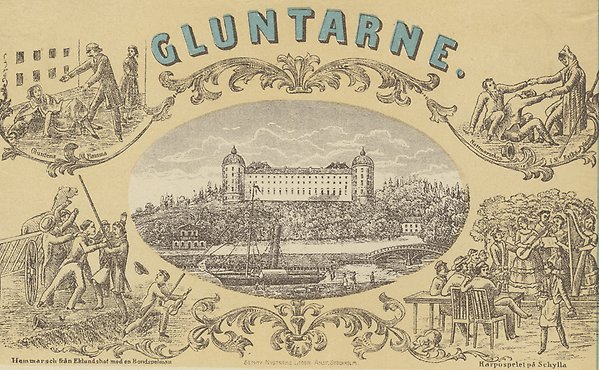Gluntarne
The famous cycle of songs about Glunten och magistern (The boy and his teacher), or simply Gluntarne as they are usually called, was written by Uppsala student Gunnar Wennerberg in the mid-19th century.

Label from a cigar box from the end of the 19th century. In the center Uppsala castle seen from the east, surrounded by four illustrations in smaller format illustrating four songs from Gunnar Wennerberg's Gluntarna.
Gunnar Wennerberg
Gunnar Wennerberg (1817–1901) was a gifted and charismatic student from the province of Västgötaland who liked to dress Bohemian and had access to the city’s literary salons. Wennerberg distinguished himself on his arrival in Uppsala by refusing to swear the student oath that had been a tradition since the 17th century. The oath was antiquated and impossible to live up to according to Wennerberg, but to be registered at the University, you had to swear it. The problem was solved when the student counsellor for the Västgöta nation, who had accompanied the nation’s new members to registration, personally assumed responsibility for Wennerberg’s conduct during his studies.
Wennerberg is most famous for the song cycle Glunten och magistern (The boy and his teacher). These songs are a kind of dramatic monologue, which were often recited at the literary salons of the time. Gluntarne, as the songs are commonly known, are about a young student, his slightly older friend and their everyday life in Uppsala, and were written for baritone, bass, and piano in 1847–1850. The original performers of the songs, and on which they were modelled, were Wennerberg himself and bass singer Otto Beronius.
Gluntarne gained enormously popularity and were soon performed to a broader audience throughout the Nordic region.
